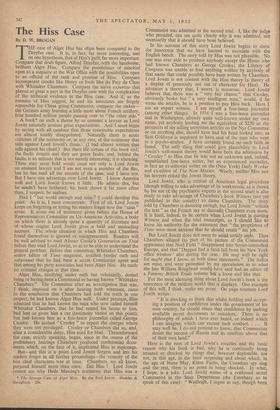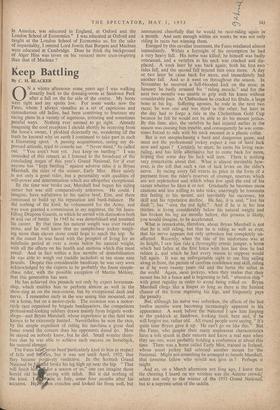The Hiss Case By D. W. BROGAN T HE case of
Alger Hiss has often been compared to the Dreyfus case. It is, in fact, far more interesting, and on one hypothesis, that of Hiss's guilt, far more important. -Compare that drab figure, Alfred Dreyfus, with the handsome, brilliant Alger Hiss. , Compare the possibilities of mischief open to a stagiaire at the War Office with the possibilities open to an official of the rank and promise of Hiss. Compare incompetent crooks like Henry or fools like du Paty de Clam with Whittaker Chambers. Compare the naive expertise that played so great a part in the Dreyfus case with the complexities of the technical evidence itr the Hiss case. And if, as the enemies of Hiss suggest, he and his associates are largely reponsible for China going Communist, compare the stakes— the German army learning a little more about French artillery, four hundred million people passing over to " the other side."
A book* on such a theme by so eminent a lawyer as Lord Jowitt naturally arouses great expectations. And 1 must begin by saying with all candour that those reasonable expectations are almost totally disappointed. Naturally there is acute criticism of the testimony or, at any rate, of the testimony that tells against Lord Jowitt's thesis. (I had almost written that tells against his client.) But there the virtues of this book end; the faults remain and they are grave faults, and, behind the faults, is an attitude that is not merely interesting; it is alarming. These may seem bold words since not only is Lord Jowitt an eminent lawyer and I am not even a member of the Bar, but he has read all the records of the case, and I have not. But I have one advantage over Lord Jowitt. I know America well and Lord Jowitt knows it little. He admits this, but he needn't have bothered; his book shows it far more often than, I suspect, he realises.
Had I ' but world enough and time," I could develop this point. As it is, I must concentrate. First of all, LOrd Jowitt keeps on forgetting or letting his readers forget how the " case " arose. It arose out of testimony given before the House of Representatives Committee on Un-American Activities, a body on which there is already quite a quantity of literature and of whose origins Lord Jowitt gives a bald and misleading account. The whole situation in which Hiss and Chambers found themselves is ignored or misrepresented. Readers will be well advised to read Alistair Cooke's Generation on Trial before they read Lord Jowitt, so as to be able to understand the general problem. Before that committee, Whittaker Chambers, senior editor of Time magazine, testified (under oath and subpoena) that he had been a secret Communist agent and that among his party associates had been Alger Hiss. He made no criminal charges at that time. , Alger Hiss, testifying under oath but voluntarily, denied being or having been a Communist or having known " Whittaker Chambers." The Committee after an investigation that was, I think, imposed on it after hearing both witnesses, came to the conclusion that Chambers had told the truth in one respect; he had known Alger Hiss well. Under pressure, Hiss admitted that he had known the man who now called himself Whittaker Chambers, that he had rented his house to him, had lent or given him a car (testimony varied on this point). but had known him as a free-lance journalist, called George Crosley. He invited "Crosley" to repeat the charges where they were not privileged. Crosley or Chambers did so, and, after a considerable delay, Hiss sued for libel. Thenceforward the case, strictly speaking, began, since in the course of the preliminary hearings Chambers produced confidential docu- ments which, on the face of it, implicated Hiss in espionage.
But—and this is a point Lord Jowitt forgets and lets his readers forget in all further proceedings—the veracity of the two chief characters was at issue. Chambers, we all know, perjured himself more than once. Did Hiss ? Lord Jowitt cannot see why Hede Massing's testimony that Hiss was a * The Strange Case of Alger Hiss. By the Earl Jowitt. Hodder & Stoughton. 20s. Communist was admitted in the second trial. I, like the judge who presided, can see quite clearly why it was admitted, not necessarily that it should have been believed.
In his account of this story Lord Jowitt begins to show the innocence that we have learned to associate with the English bench. The story told by Hiss was not plausible. No one was ever able to produce anybody except the Hisses who had known Chambers as George Crosley; the Library of Congress was unable to find anything written' by anybody of that name that could possibly have been written by Chambers. Lord Jowitt is not content with the Hiss theory (a theory of a display of generosity not out of character for .Hiss). He advances a theory that, I assert, is nonsense. Lord Jowitt' believes that there was a "very fair chance" that Crosley, obviously broke but " a very intelligent man," would, if he wrote the articles; be in a position to pay Hiss back. Here I am an expert witness. I am myself a free-lance journalist (among other things). In 1934 I was a free-lance journalist and in Washington, already quite well-known under my own name, yet anybody lending me the equivalent of $250 on the prospects of my selling unwritten articles on the Nye Committee or on anything else, should have had his head looked into, as Sam Goldwyn is supposed to have said of the man who went to a psycho-analyst. I have certainly found no such faith, in 'Israel. The only thing that could give plausibility to Lord Jowitt's well-meant theory would have been the admission by " Crosley " to Hiss that he was not an unknown and, indeed, unpublished free-lance writer, but an experienced journalist, in fact an ex-editorial writer on the (New York) Daily Worker and ex-editor of The New Masses. Wisely, neither Hiss nor his lawyers risked the Jowitt theory.
Lord Jowitt, who is critical of American legal procedure (though willing to take advantage of its weaknesses, as is shown by his use of the psychiatric experts in the second trial) is also ready to take advantage of Chambers's book Witness (not yet published in this country) to damn Chambers. The story told by Chambers is damning enough, but Lord Jowitt " solicits the text " as the French say to discredit Chambers even more, It is hard, indeed, to be certain when Lord Jowitt is quoting Witness and when the trial transcripts, so I should like to know his authority for the statement that " the proprietors of Time were most anxious that he should retain " his job.
But Lord Jowitt does not seem to mind untidy ends. Thus Chambers alleged (as part of his picture of the Communist apparatus) that Noel Field " disappeared into Soviet-controlled Europe, and that ` Duggan had a fatal fall from his New.York office window' also during the case. He may well be right for aught that I know, in both these statements." The italics are mine, and were prompted by my speculation as to what the late William Roughead would, have said had. an editor of a Famous British Trials volume left a loose end like that.
For the most alarming thing about Lord Jowitt's book is the innocence of the modern world that it displays. One example of this will, I think, make my point. On page nineteen Lord Jowitt writes " It' is shocking to think that whilst holding and accept- ing a position of confidence under the government of his own country, he should abuse that confidence by making available secret documents to outsiders. There is no philosophy of which I have ever heard, or indeed which I can imagine, which can excuse such conduct. . . . It may well be, I do not pretend to know, that Communists desire the success of Russia and its satellites above that of their own land."
Here is the root of Lord Jowitt's troubles and the basic reason why his book is bad, why he is continually being amazed or shocked by things that, however deplorable, are not, in this age, in the least surprising and about which, in the age of Nunn May, Klaus Fuchs, the Canadian spy ring and the rest, there is no point in being shocked. In what. I hope, is a joke, Lord Jowitt writes of a confessed secret Communist in. the State Department (the Esterhazy so to speak of this case): " Wadleigh, I regret to say, though born in America, was educated in England, at Oxford and the London School of Economics." I was educated at Oxford and taught at the London School of Economics so, for the sake of impartiality, I remind Lord Jowitt that Burgess and Maclean were educated at Cambridge. Does he think the background of Alger Hiss was (even on his version) more trust-inspiring than that of Maclean ?



































 Previous page
Previous page